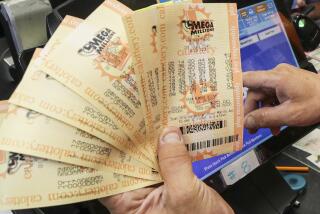Home for the Elderly Gets a Large Slice of Spain’s ‘El Gordo’ Lottery
- Share via
MADRID — A humble home for the elderly and a Spanish immigrant in Australia received windfalls Monday from Spain’s $550-million Christmas lottery--the world’s biggest.
Well-wishers flocked to the Home for the Elderly in Palencia, northern Spain, which won a $3.7-million share of the lottery’s largest prize, known as “El Gordo” (The Fat One), worth $120 million this year.
“The club started its Christmas party early,” said a city official. “They are very poor, and they have won small fortunes that they could only dream about.”
Jose Nunez Montufo, a tobacco-growing Spanish immigrant in Australia, held two of the 65 winning tickets, together worth $3.5 million.
“What good news you are giving me,” he told Spanish radio from Myrtleford in Victoria state. Montufo said he had bought the tickets in his native village of Archidona in southern Spain during his summer vacation and distributed them, divided into tenths, to relatives.
Some Winners Faint
There were wild celebrations at an oil refinery in La Coruna in northwestern Spain, where 680 workers held all the tickets for the second prize of $57 million. Several of the workers fainted when they heard they held winning tickets, a refinery spokesman said.
The nation ground to a halt Monday for the lottery drawing. Following a 223-year seasonal tradition, orphans at Madrid’s San Idlefonso School chanted the winning numbers as they plucked them from revolving wire drums during a three-hour drawing broadcast live on radio and television.
Other lotteries award larger single prizes, but Spain’s is the world’s richest in total winnings.
Most Spaniards participate in the contest, which in Spain is more popular than Santa Claus and other rites of Christmas. Many people heed an old Spanish saying that warns, “He who buys too many lottery tickets is a madman, but he who buys none at all is a fool.”
Most Buy 10% Shares of Tickets
To enhance their chances of sharing in the more than 650,000 prizes, most people buy several decimos, or 10% shares, of tickets, which are sold at work, local shops and on street corners.
Spaniards take their Gordo very seriously. Using a mixture of science and superstition, they reserve favored numbers months in advance and often keep numbers in the family for generations.
In 1978, a bank clerk became a millionaire with the same number that 22 years earlier made his father a wealthy man.
King Carlos III dreamed up the lottery in 1763 as a revenue-raising measure, and it has been held every year since then.
More to Read
Sign up for Essential California
The most important California stories and recommendations in your inbox every morning.
You may occasionally receive promotional content from the Los Angeles Times.










